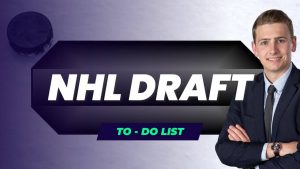[vc_row][vc_column][vc_column_text]In part 2 of this blog series, I will be diving into Signing Bonuses. If you haven’t read Part 1 – NHL Performance Bonuses – I would do that first.
Signing Bonuses
Performance bonuses are only awarded if a player achieves some agreed-upon benchmark. Signing bonuses are part of the players’ salary and count as part of the salary cap hit.
A lot of top players now have their contracts designed to include hefty signing bonuses and lower base salaries. A few of the reasons for doing this include “Lockout-Proofing” a contract, “Buyout-Proofing” a contract, and receiving cash upfront as opposed to throughout the season. Let’s explore these further.
Lockout-Proofing
One of the big benefits for a player receiving a signing bonus instead of a base salary is that it can ensure the player gets paid in the event of a lockout.
When the NHLPA and NHL cannot agree upon all the conditions within the Collective Bargaining Agreement, one of the negotiating tools Bettman can use is to force the league into a lockout – where no games are played. When this happens, since there is no work being done (no games played), players’ salaries are not paid.
The current CBA is set to expire on September 15th, 2026. If your contract stipulates that you receive $5,000,000 of your income as a signing bonus on July 1st, you’re going to receive that cheque regardless of if there is a lockout or not.
This is a massive benefit to the players whose contracts are negotiated this way.
Buyout-Proofing
An option teams have when they no longer want a player at their current salary cap hit is to “buy out” that player’s contract. Here’s how it works under the current CBA:
- Take two-thirds of the remaining salary owed, not including signing bonuses.
- Spread that remaining money out over twice the remaining contract length
- The new cap hit is determined by subtracting the savings from the average annual value of the deal which includes signing bonuses.
In other words, a team can spread the remaining salary owed to the player out over twice the amount of time, thereby reducing the annual salary cap hit.
What a lot of players and agents have done recently is design their contracts to be primarily bonus money in the first few years and primarily base salary in the final years. What this does is disincentivize teams to buy out the contract in the early years of the contract, since the salary cap savings will be so minimal until the final season of the deal. See a more in-depth example of a buyout-proof contract here.
It’s a great way for a player to ensure they are going to receive most of their contract, which is a nice bonus – pun intended.
Cash Up Front
Another incentive to receive a signing bonus in lieu of base salary is that you can receive all, or a good portion, of your salary for that season upfront.
Here’s a simple investment example of why cash upfront is valuable:
Example:
Scenario A: You can have $1.2 million on January 1st
Scenario B: You can earn $100,000 per month for 12 months.
In both scenarios, your income is $1.2 million, the only difference is the timing of payments.
If we create a hypothetical investment, assuming 0% tax and an 8% annual return on your investment, here are the results on December 31st:
[/vc_column_text][dt_fancy_image image_id=”9275″ width=”1500″ css=”.vc_custom_1673289206870{padding-top: 20px !important;padding-bottom: 20px !important;}”][vc_column_text]
Source: Adam Henry – Excel Table – assumes zero taxes, 8% annual return compounded monthly.
In scenario A you have $44,582 more dollars than in scenario B. Take this example and compare it to Nathan Mackinnon’s first-year signing bonus of $15.725 million and you can imagine the benefit of the cash up front in that scenario!
Drawbacks
I’ve outlined some of the advantages when it comes to signing bonuses. Unfortunately, not every player will have the opportunity to structure their deals this way. There are a few things to consider:
- Typically, only the star players will have the leverage in a negotiation to structure their contracts this way. Think of my example in my previous article (Dyl, insert link here once it is up) regarding performance bonuses, and how the 1st overall pick will likely have more than the 20th overall pick.
- Not every team is willing to do this. Depending on the ownership and management, some teams won’t be interested in exploring the signing bonus option – see Matt Barzal’s contract with the New York Islanders as an example.
- Not every team has the cash flow to do this. It is no secret that there are bigger and small market teams – think Toronto Maple Leafs compared to The Winnipeg Jets. Writing a $15 million dollar cheque on July 1st might be difficult for a team constrained by lower revenue. Some teams might include signing bonuses in the contract, but instead of one payment on July 1st, it might be 4 equal payments throughout the year, which might not be as
Summary
Signing bonuses clearly provide value in the customization of a contract for a player. Whether or not the next CBA will incorporate rules or regulations that change the landscape moving forward is unknown. For today, if you have leverage in the negotiation process and would like a little more control over your cash flow, and to guarantee you’ll get your money in a lockout season, then signing bonuses might be your answer.
Sources:
The basics on NHL contract bonuses – Pension Plan Puppets
Buyout History – CapFriendly – NHL Salary Caps
Performance Bonuses and Carryovers | Puckpedia
Nathan MacKinnon Contract, Cap Hit, Salary and Stats – CapFriendly – NHL Salary Caps
The Signing Bonus: Rise Of The Buyout-Proof Contract (prohockeyrumors.com)
The basics on NHL contract bonuses – Pension Plan Puppets
NHL Active Player Contracts | Spotrac
NHL CBA FAQ – CapFriendly – NHL Salary Caps
Mathew Barzal Contract, Cap Hit, Salary and Stats – CapFriendly – NHL Salary Caps[/vc_column_text][/vc_column][/vc_row]



